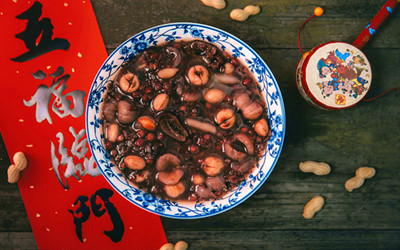Skype: neodalle-travel
Tel: +86 135 7447 2266
E-mail: sales@visitaroundchina.com

 Chinese Laba Rice Porridge Festival falls on 8th Day of 12th Lunar Month. Chinese people start their preparations for the Chinese Spring Festival more than 20 days ahead. The 12th lunar month in Chinese is called la yue, so the eighth day of this lunar month is la yue chu ba, or laba. Three major customs on Laba are ancestor worship, eating Laba rice porridge and making Laba garlic. Especially, people will have Laba Rice Porridge on this day.
Chinese Laba Rice Porridge Festival falls on 8th Day of 12th Lunar Month. Chinese people start their preparations for the Chinese Spring Festival more than 20 days ahead. The 12th lunar month in Chinese is called la yue, so the eighth day of this lunar month is la yue chu ba, or laba. Three major customs on Laba are ancestor worship, eating Laba rice porridge and making Laba garlic. Especially, people will have Laba Rice Porridge on this day.
Legend of Laba Festival
This tradition originated from Indian Buddhism. Legend has it that Sakyamuni became a Buddhist under a banyan on the eighth day of the twelfth lunar month. Afterwards, people would have rice porridge on this day in memory of the Buddha's sufferings. Also, Laba Rice Porridge would be cooked on this day in temples in many places, with rice, nutlet, millet, etc. as the raw material. It would be sacrificed to the Buddha first and then given out to disciples and the poor. Since Laba Rice Porridge was believed to be blessed with good fortune and longevity, it was also called "Longevity Blessing Porridge" and "Virtue Blessing Porridge".
Since then Laba Rice Porridge was prepared on the eighth day of the twelfth lunar month in courts, officials' mansions, temples and common people's homes. This custom became more prevalent in the Qing Dynasty. On this day, the emperor, empress and princes in the royal court would bestow Laba Rice Porridge to civil and military ministers as well as attendants and maids of honor. Also, they would give out rice, fruits and other materials to monks in temples. Meanwhile, every common family would cook Laba Rice Porridge and offer sacrifice to their ancestors. Then all family members would get together to have the porridge.
Custom on Laba Festival
After being introduced to China, this custom was combined with quite a lot of Chinese traditional ones. For example, the cooked Laba Rice Porridge would be sacrificed to ancestors first. Also, having Laba Rice Porridge with part of it uneaten would be regarded as luckiness and wealthiness; well-off families would give out porridge to the poor for they believed such charitable move would help to accumulate their own virtue. It is also a custom in some regions to daub Laba Rice Porridge onto fruit trees in the hope of a good harvest and auspice in the coming year.
Ancestor worship
At the end of the year, working people get more free time to prepare for the sacrifice to the ancestors. The reason the 12th lunar month is called La Yue has a lot to do with the custom of sacrifice. First, the worship of ancestors, called "腊" in Chinese, and the sacrifice for the gods, called "蜡", both frequently took place in the 12th month, which led to the traditional name of the month: la yue. Second, winter is the slack season for farmers so they have time to find things to burn in the sacrifice. The radical of "腊" represents the sacrifice of meat to one's ancestors ("月" symbolizes meat).
Laba rice porridge
There are several legends about the origin of porridge eating on Laba: Some claim it is of Buddhist origin; some say the porridge, made of red beans, can exorcize evil from children. Others say the porridge is in memory of a poor couple. The custom of porridge eating has been well known throughout history, from the royal court to common people. The most "authentic" porridge was made in northern China, especially Beiping, today's Beijing.
The main ingredients of the Laba porridge are rice and sticky rice; people also add sugar, red dates, lotus seeds, walnuts, chestnuts, almonds, longans, hazelnuts, raisins, red beans, peanuts, water caltrops, roseleaf and other various materials to make the porridge special.
 Ask Questions ?
Ask Questions ?